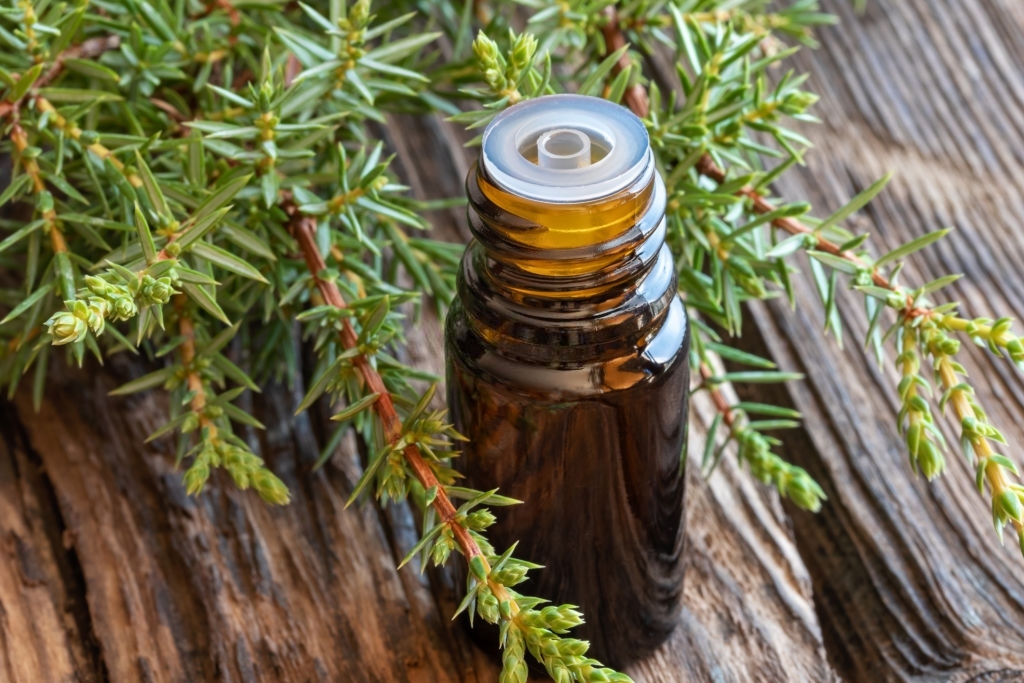Juniper, whose botanical name is Juniperus communis L., belongs to the Cupressaceae family. The essential oil comes from the fruiting cones or “Juniper berries”. Juniper essential oil, from a tree with a rich history, has been considered a panacea for centuries. Its origins date back to prehistoric times, when its properties were already recognised and used. This article takes an in-depth look at this remarkable essence.
A little history
Juniper berries have been known and used since prehistoric times, when they were found in stone troughs inside certain caves. TheEbers papyrus mentions them around 1500 BC, when juniper “berries” were already being used to treat digestive pains and urinary problems.
As far back as antiquity, the Greeks and Romans used the berries in medicine (for its diuretic action), in cooking and as a fumigant. Dioscorides, Nero’s physician, said that juniper was excellent “for making people urinate, for stomach aches, chest illnesses, curing spasms and suffocations of the womb…”
Juniper was already known to the Greeks and Arabs. Avicenna (11th century) said it dilated obstructions and was used against hysteria. It was also used to purify the bronchi and liver and against insect and scorpion bites. In the Middle Ages, Saint Hildegarde (13th century) revealed its effects against kidney and bladder diseases, as well as headaches. Thrown into the fire, the twigs were thought to ward off evil spirits (a use still attested to in Himalayan monasteries). It was also burnt to ward off the plague.
Fuchs (16th century) considered it to be a universal antidote, recalling the panacea role attributed to its wood in fumigation against epidemics since Antiquity. In the 19th century, Cazin reported that the berries were tonic, stomachic and diuretic, giving the urine a violet odour. They are therefore recommended for lung ailments, kidney infections linked to stones, chronic skin ailments and rheumatism.
Fournier (20th century) also points out that the berries, the tips of the twigs, the wood and the ashes activate the functions of the kidneys and are depurative, stimulating and sudorific. Mathiole, Helvétius and many ancient therapists also attributed eminent properties to it. Abbé Kneipp frequently prescribed them to purify the blood and clear up skin diseases. Juniper berries are used as a spice in sauerkraut and to flavour spirits such as gin.
Origin and uses of Juniper :
Juniper(Juniperus communis) is a small thorny tree in the cypress family whose berries (in fact, pseudofruits) take three years to ripen, turning from light green to black. Juniper berries are used to flavour game dishes, pâtés and sauerkraut. They are reputed to aid the digestion of high-fat dishes. They are also used to flavour various alcohols: juniper wine, gin, aquavit, jenever, for example.
In phytotherapy, ripe juniper berries are used to increase the volume of urine in cases ofurinary tract infection or to aid digestion. Juniper essential oil can be applied locally to relieve muscle and joint pain.
Traditional phytotherapy also uses other diuretic plants as complementary treatments for urinary tract infections:
- Birch (Betula pendula)
- Borage (Borago officinalis)
- Blackcurrant (Ribes nigrum)
- Nettle (Urtica dioica)
- Hawkweed (Hieracium pilosella)
- Dandelion (Taraxacum officinale)
- Horsetail (Equisetum arvense)
What are the pharmacological properties of Juniper berry essential oil?
Antimicrobial properties :
The antimicrobial activity of juniper essential oil has been demonstrated in vitro against staphylococcus aureus, Escherichia coli, Proteus mirabilis, Pseudomonas aeruginosa and Klebsiella pneumoniae. Its antiviral activity has also been demonstrated against the herpes virus HSV-1. Its antifungal effect has been demonstrated in vitro against Candida albicans and dermatophytes.
Diuretic properties :
An experiment has shown that treatment with an aqueous extract, an essential oil solution or terpineol-4 maintains normal urinary excretion when subjects are treated with antidiuretic hormone, which greatly reduces urine production. The essential oil, in particular terpineol-4, is directly involved in this effect, which has been demonstrated in humans. There is no increase in sodium in the urine, but uric acid is excreted.
Juniper is therefore an adjuvant to diuresis cures for benign urinary disorders.
Hepato-pancreatic properties :
The essential oil stimulates choleresis and , in particular, reduces the formation of gallstones. The α-pinene is therefore hepatoprotective.
A digestive tonic in cases of hepato-pancreatic insufficiency, juniper essential oil is also anti-fermentative, intestinal anti-putrid, anti-degenerative (hepatic, stomach, duodenum) and protects the Küpffer cells of the liver (as a good immunological protector of the liver). Juniper is also choleretic and increases bile secretion.
It also has a beneficial effect on the large intestine, and is reputed to have an anti-putrid effect on the intestine in cases of colitis (relationship between the intestine and the urinary tract).
Expectorant properties:
Among other things, α-pinene reduces bronchial and venotonic secretions.
Renal protective property :
Juniper essential oil purifies the kidney filter and has a beneficial effect on the kidney.
Other properties:
- Cerebral tonic, anti-asthenic
- Anti-rheumatic (promotes excretion of kidney toxins and uric acid)
- Lymphotonic and decongestant
- Antispasmodic and regulates the autonomic nervous system
- Inhibitor of protein glycation, involved in the prevention of diabetic complications
- Antioxidant and acetylcholinesterase activity, with potential use in Alzheimer’ s disease
- Antioxidant and anti-hypercholesterolaemic activity, with potential for preventing atherosclerosis
- Drains subcutaneous tissue topically
- Topical anti-inflammatory and analgesic action
- Cortison-like
Recent studies on Common juniper essential oil
A study has highlighted the potential of common juniper as a nutraceutical in human and veterinary medicine. This plant, rich in aromatic oils, invert sugars, resins and various other compounds, has traditionally been used as a diuretic, anti-arthritic, anti-diabetic and antiseptic, as well as for the treatment of gastrointestinal and auto-immune disorders. Juniper essential oil and extracts have demonstrated antioxidant, antibacterial, antiviral and antifungal activities. Recent studies have also identified anti-inflammatory, cytotoxic, hypoglycaemic and lipid-lowering effects of the berries in experimental models.
Other research has highlighted the main phenolic compounds and volatile organic compounds present in the various parts of the common juniper. These compounds are associated with various health-promoting properties, such as effects on the enzymes AST and ALT, anticholinesterase activity, and an influence on various proteins and factors linked to apoptosis and inflammation.
A study also examined the yield, chemical composition and bioactivity of common juniper essential oils from different regions of Spain. It was found that the essential oils had antibacterial activity, particularly against gram-positive bacteria, and showed anti-inflammatory activity. The oils also had a cytotoxic effect on certain tumour cell lines, underlining their potential in the development of anti-cancer treatments.
Finally, a comparative analysis of common juniper berry extracts revealed that different extraction methods and solvents influence the antimicrobial, antioxidant and nematocidal activity of the extracts. For example, 70% ethanol extracts and acetone extracts contained monoterpenes, sesquiterpenes, polysaccharides, steroids, fatty acid esters and bicyclic monoterpenes. This study provided detailed information on the chemical composition and biological activity of these extracts.
These studies demonstrate the growing interest in the essential oil and extracts of Juniperus communis L. because of their many potential applications in medicine and other fields.
Does Juniper essential oil require any precautions for use?
- Recommended for people with acidic skin
- Not recommended for pregnant or breast-feeding women or children under 8 years of age
- Be careful when using this essential oil locally on too large an area (it may cause skin irritation)
- Do not inhale, diffuse or put in bath water
- Do not combine with cortisone, risk of drug interaction
- Drug interactions with essential oils containing more than 10% ketones or phenols
- Caution in cases of renal insufficiency per os
- Inhibition of cytochrome P450, risk of drug interactions, ask your pharmacist for advice
- Not recommended for asthmatics
- Not recommended for animals
- Contraindicated in cases of heavy menstrual bleeding
- Caution: risk of albuminuria if taken for too long
Forms and dosage of Juniper :
Dried juniper berries are used in the form of a decoction: 2 g of dried berries boiled for 20 minutes in 150 ml of water, two to three times a day (before meals to relieve digestive problems). The European Medicines Agency suggests a specific intake schedule when a diuretic effect is sought: chew five berries on the first day of treatment, six on the second, seven on the third and so on until you reach fifteen berries a day; then gradually reduce to five berries a day at the same rate, for a total treatment period of three weeks.
Juniper essential oil can be diluted in sweet almond oil (3 to 5 ml of essential oil per 100 ml of almond oil) or in soap (a few drops) and added to a bath.
When Juniper is used for diuretic purposes, it is advisable to drink at least two litres of water a day for the duration of the treatment.
What the health authorities think:
THE EMA
The European Medicines Agency considers the use of juniper berries to be “traditionally established” for the “complementary diuretic treatment of urinary tract infections” and as a “symptomatic treatment for digestive disorders, in particular difficult digestion and flatulence”. It recommends a maximum treatment period of three weeks.
THE E
Commission E of the German Ministry of Health recognises the use of juniper berries to “relieve digestive disorders”.
ESCOP
The European Scientific Cooperation on Phytotherapy, recognises the use of juniper berries to “promote renal elimination of water and relieve digestive disorders, in the absence of scientific evidence justifying these uses”.
Medical bibliographical sources and clinical trials:
- Komeh-Nkrumah SA, Nanjundaiah SM, Rajaiah R, Yu H, Moudgil KD. Topical dermal car application of essential oils attenuates the severity of adjuvant arthritis in Lewis rats. Phytotherapy Research. 2012
- Asgary S, Naderi GA, Shams Ardekani MR, Sahebkar A, Airin A, Aslani S, Kasher T, Emami SA. Inhibition of protein glycation by essential oils of branchlets and fruits of Juniperus communis subsp. hemisphaerica. Res Pharm Sci. 2014
- Cioanca O, Hancianu M, Mihasan M, Hritcu L. Anti-acetylcholinesterase and Antioxidant Activities of Inhaled Juniper Oil on Amyloid Beta (1-42)-Induced Oxidative Stress in the Rat Hippocampus. Neurochem Res. 2015
- Gumral N, Kumbul car DD, Aylak F, Saygin M, Savik E. Juniperus communis Linn oil decreases oxidative stress and increases antioxidant enzymes in the heart of rats administered a diet rich in cholesterol. Toxicol Ind Health. 2015
- Wanzala W, Hassanali A, Mukabana WR, Takken W. Repellent Activities of Essential Oils of Some Plants Traditionally Used to Control the Brown Ear Tick, Rhipicephalus appendiculatus.J Parasitol Res. 2014
- Heliyon. 2019 Aug 31;5(8):e02376. doi: 10.1016/j.heliyon.2019.e02376. eCollection 2019 Aug. Potential of Juniperus communis L as a nutraceutical in human and veterinary medicine
- Plants (Basel). 2023 Sep 27;12(19):3401. doi: 10.3390/plants12193401. Comparative Analysis of Chemical Profile and Biological Activity of Juniperus communis L. Berry Extracts
- Molecules . 2023 May 30;28(11):4448. doi: 10.3390/molecules28114448. Yield, Chemical Composition and Bioactivity of Essential Oils from Common Juniper ( Juniperus communis L.) from Different Spanish Origins
- Int J Mol Sci. 2022 Mar 16;23(6):3197. doi: 10.3390/ijms23063197. Zimbro ( Juniperus communis L.) as a Promising Source of Bioactive Compounds and Biomedical Activities: A Review on Recent Trends







